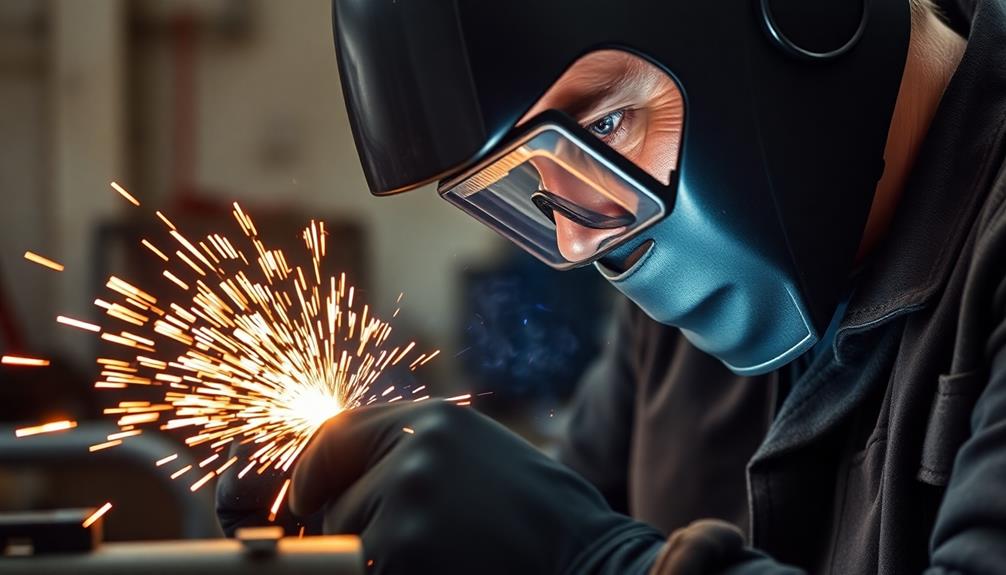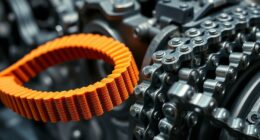The most expensive automotive repairs typically involve significant engine or transmission issues, often costing over $10,000. For instance, engine replacements can range from $5,000 to $16,000, while transmission repairs usually set you back between $3,000 and $9,000. Luxury and hybrid vehicles can see costs soar even higher due to specialized parts and advanced technology. It's essential to keep up with regular maintenance to avoid these hefty bills. By understanding potential repair costs, you can better prepare for any unexpected auto expenses that may come your way. There's much more to discover about costly repairs and how to prevent them.
Key Takeaways
- Engine repair or replacement is one of the most costly automotive repairs, ranging from $2,000 to $16,000 depending on damage severity.
- Transmission repairs can be expensive, with overhaul costs ranging from $2,800 to $8,000 and replacement costs between $3,000 and $5,000.
- Hybrid battery replacements can cost between $1,000 and $6,000, while electric vehicle battery replacements may exceed $20,000.
- Catalytic converter replacement costs vary widely, ranging from $900 to $4,500, influenced by vehicle make and model.
- Suspension and steering repairs can be costly, typically ranging from $1,000 to over $3,500, depending on the extent of the damage.
Factors Influencing Repair Costs

When it comes to automotive repair costs, several key factors play an essential role in determining how much you'll end up spending. The extent of damage is one of the most critical elements. Major repairs, such as engine or transmission replacements, can set you back anywhere from $4,000 to $10,000 or more. Additionally, the make and model of your vehicle can significantly affect repair costs, with luxury or imported vehicles typically requiring more expensive parts and specialized labor. To mitigate these expenses, many car owners consider the cost of automotive repair insurance, which can help cover unexpected repairs and reduce out-of-pocket payments. However, it’s essential to carefully evaluate whether the insurance premiums are worth the potential savings in repair costs.
Your vehicle make and model also greatly influences repair costs. Luxury and performance vehicles often incur expenses 20-50% higher than standard models, so keep that in mind when considering repairs.
The age of your vehicle is another factor. Older cars generally require more repairs due to worn components, leading to increased repair costs.
Additionally, parts availability can impact your expenses. If you own a rare or discontinued model, sourcing parts might be challenging, driving up costs further.
Finally, don't forget about labor. Repair shops charge varying rates based on technician expertise; skilled labor usually commands higher fees, which can add to your total expenses.
Overview of Expensive Repairs
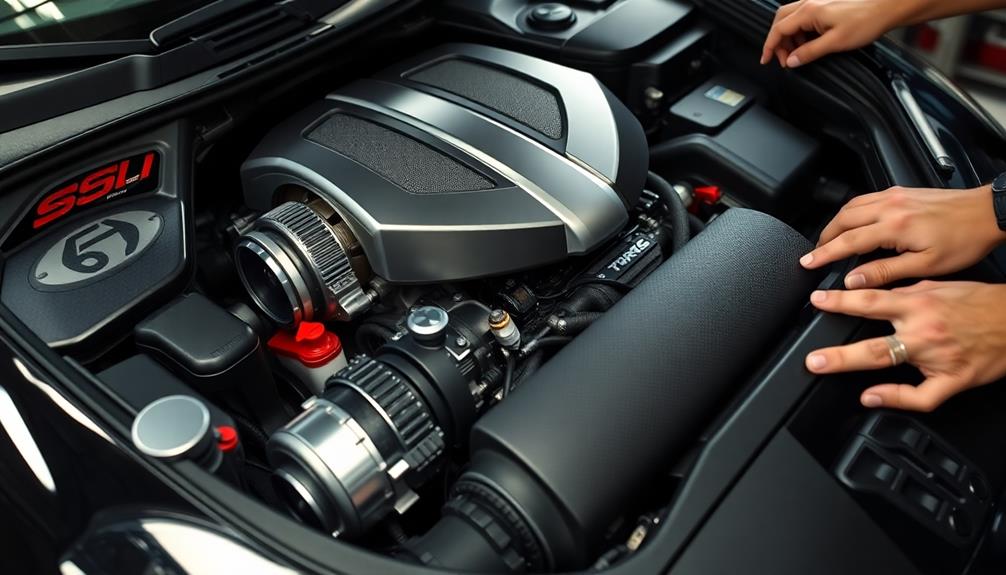
Automotive repairs can quickly become a financial burden, especially when tackling major issues. Among the most expensive repairs, engine and transmission work top the list, often resulting in hefty bills that can strain your budget. It's important to recognize these potential costs to prepare accordingly.
Here's a quick glance at some of the most common expensive repairs:
| Repair Type | Estimated Cost |
|---|---|
| Engine Repair/Replacement | $5,000 – $16,000 |
| Transmission Repair | $3,000 – $9,000 |
| Catalytic Converter Replacement | $900 – $4,500 |
Engine repairs can be particularly challenging, with costs reaching up to $16,000. Transmission issues, if left unaddressed, can also lead to significant expenses, making timely maintenance essential. Additionally, don't overlook the catalytic converter; replacing it can be costly, especially as emissions regulations become stricter.
Understanding these expenses can help you make informed decisions and prioritize maintenance, keeping your vehicle running smoothly without breaking the bank.
Transmission Overhaul and Replacement
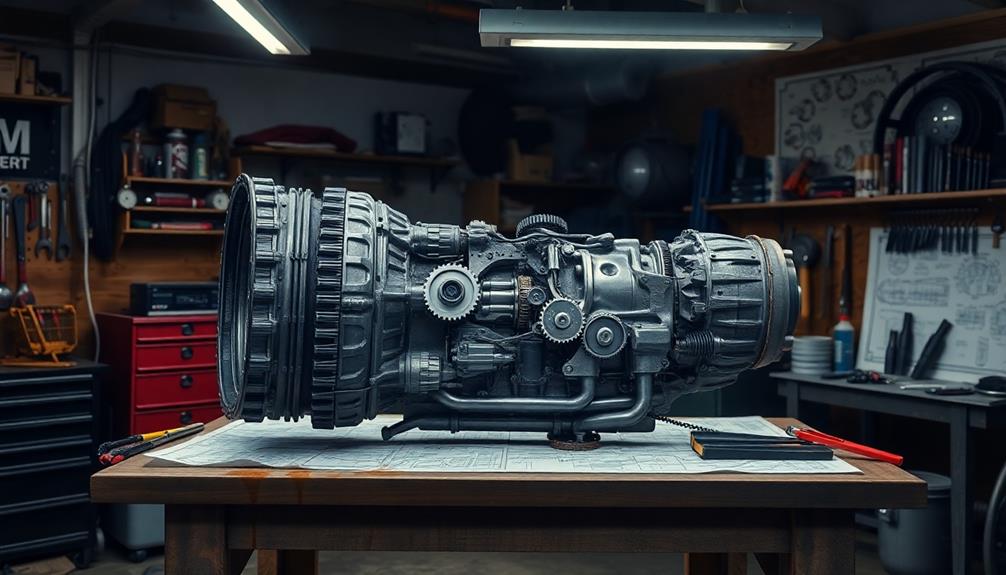
Transmission overhauls and replacements can be among the costliest repairs you might face as a vehicle owner. The costs for a transmission replacement typically range from $3,000 to $5,000, depending on your vehicle's make, model, and the complexity of its transmission system.
If you opt for a transmission overhaul, which involves extensive labor and detailed repairs, you could be looking at expenses between $2,800 and $8,000.
It's essential to recognize the symptoms of transmission issues early on. Slipping gears, unusual noises, and burning smells can indicate trouble. Addressing these problems promptly can prevent more extensive damage and help you avoid even more expensive repairs down the line.
Regular maintenance plays an important role in extending the life of your transmission. Keeping the transmission fluid fresh and following manufacturer guidelines can greatly reduce the likelihood of needing a costly overhaul or replacement.
Be aware that luxury and high-performance vehicles often come with higher repair costs—typically 20-50% more than standard vehicles—due to their complex systems and specialized parts. So, staying proactive with maintenance is key to avoiding these hefty expenses.
Engine Repair and Replacement
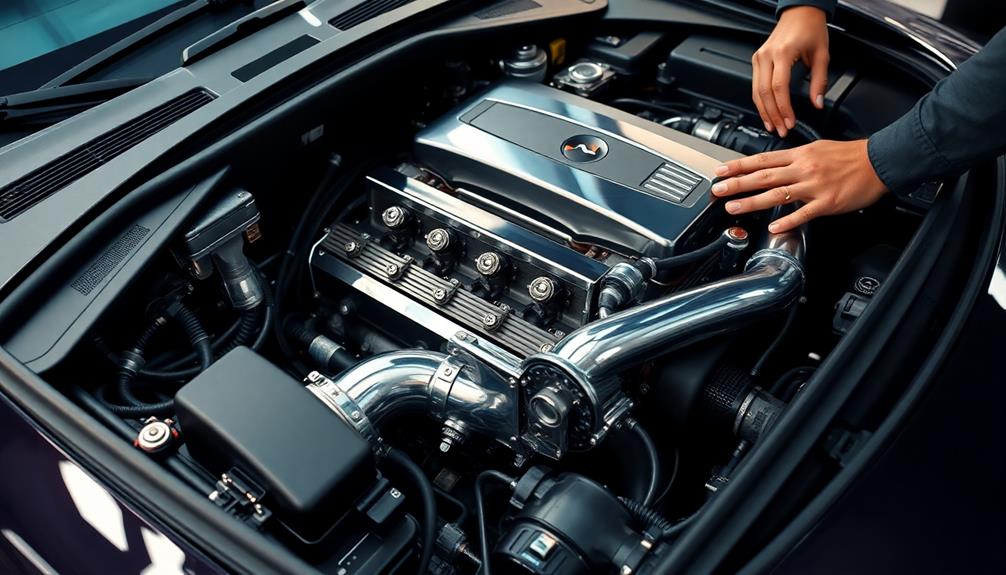
When it comes to engine repair and replacement, costs can quickly add up, ranging from $2,000 to $16,000 depending on the damage.
Understanding the importance of regular maintenance, like timely oil changes, can save you from facing these hefty bills.
Repair Cost Overview
Engine repairs and replacements can be a formidable expense for vehicle owners, often leading to significant financial strain. Understanding the repair cost overview is essential to prepare for potential expenses. Depending on the engine type, replacement costs can vary widely.
Here's a breakdown of some common repair costs:
| Repair Type | Estimated Cost |
|---|---|
| Engine Replacement | $5,000 – $16,000 |
| Engine Rebuild | $2,000 – $4,500 |
| Head Gasket Replacement | $3,456 – $5,459 |
| Cracked Engine Block Repair | $3,000 – $5,000+ |
While engine replacements tend to be the most expensive repair, rebuilding an engine is generally more affordable but may not guarantee the same reliability. Additionally, neglecting issues like a failing head gasket can lead to even more costly repairs down the line.
Cracked engine blocks and cylinder replacements can also approach the cost of new engines. By being aware of these potential expenses, you can make informed decisions and hopefully avoid the pitfalls of expensive repairs.
Maintenance Importance
Regular maintenance is essential for keeping your engine running smoothly and avoiding costly repairs down the line. Neglecting simple tasks like regular oil changes can lead to severe engine damage, resulting in repairs that could set you back anywhere from $2,000 to $10,000.
Imagine facing an engine replacement—four-cylinder engines can cost around $4,000, while V6 and V8 engines might run you $5,500 and $7,000, respectively.
Don't overlook the importance of preventative maintenance. For instance, a blown head gasket can cause extensive damage, with replacement costs averaging between $1,200 and $2,000.
Regular maintenance can help prevent such failures, saving you from the risk of expensive repairs. Cylinder replacement is another costly endeavor, often exceeding $8,000. If multiple cylinders are affected, it may be more economical to weigh the option of a full engine replacement.
Hybrid and Electric Battery Costs

Many vehicle owners might be surprised by the high costs associated with hybrid and electric battery replacements. Hybrid battery replacement can range from $1,000 to $6,000, but when it comes to electric vehicle batteries, the costs can soar above $20,000. This steep price tag often results from advanced technology and complex manufacturing processes.
Typically, hybrid batteries last between 8 to 15 years, influenced by your driving habits, charging cycles, and environmental factors. To avoid paying for an expensive repair, regular maintenance and adherence to manufacturer guidelines can help extend your battery's life.
If you own a hybrid, consider getting an extended warranty, which can cover replacement costs for up to 10 years or 100,000 miles. This can provide you with some financial peace of mind.
However, don't delay necessary repairs. Ignoring issues can lead to more extensive damage, resulting in markedly higher replacement costs.
Understanding these factors can help you make informed decisions, ensuring you're prepared for any potential expenses related to hybrid and electric batteries.
Suspension and Steering Repairs
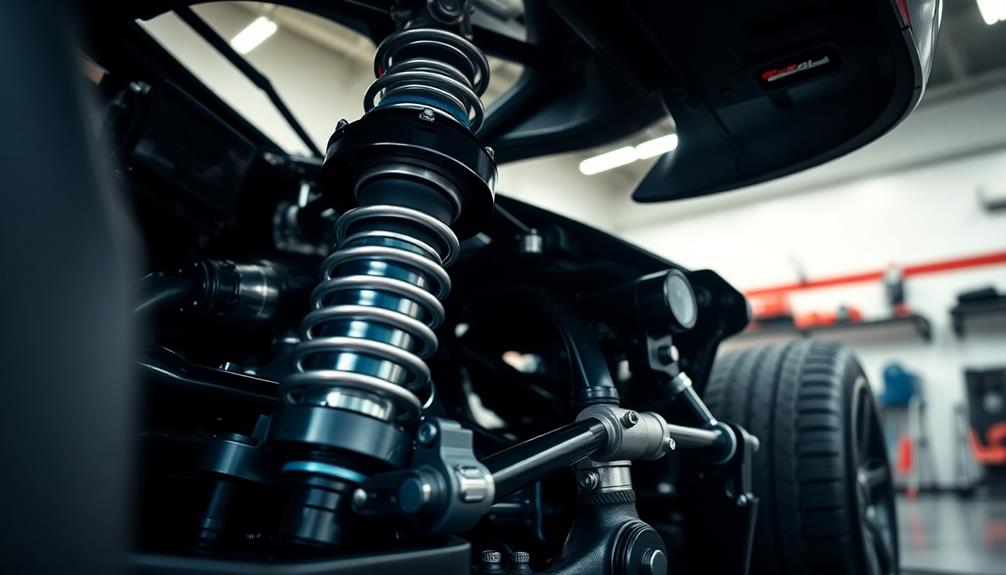
When it comes to suspension and steering repairs, costs can quickly add up, often ranging from $1,000 to over $3,500.
You might notice symptoms like bumpy rides or uneven tire wear, signaling that it's time for a check-up.
Regular maintenance is essential; addressing issues early can save you from more extensive and costly repairs later on.
Common Suspension Problems
Suspension problems can considerably affect your vehicle's performance and safety. You might notice symptoms like uneven tire wear, bumpy rides, or excessive noise when driving over bumps. These signs indicate that you need to inspect your suspension system.
If you ignore these issues, you could face more expensive repairs down the line.
Key suspension components, including shocks, struts, and bushings, play a vital role in ensuring ride comfort and vehicle handling. When these parts fail, not only does your ride become uncomfortable, but your safety also becomes compromised.
Regular inspections can help you catch suspension problems early, potentially saving you from costly overhauls that can range from $1,000 to $3,500.
Prompt suspension repairs are essential. Delaying maintenance can lead to further damage, which will only escalate repair costs.
Cost of Repairs
Repairing your vehicle's suspension and steering systems can hit your wallet hard, with costs varying widely based on the extent of the damage.
Suspension repairs typically range from $1,000 to $2,500, while complete overhauls can climb between $2,500 and $3,500. If you notice symptoms like uneven tire wear or bumpy rides, it's essential to act quickly. These issues can compromise your safety and lead to even more expensive repairs down the line.
Steering repairs can also be costly, often ranging from $500 to $3,500, depending on the complexity of the system. When you neglect suspension and steering maintenance, you risk accelerated wear on tires and other components, which can greatly increase the overall cost of the repair.
Visiting a reputable repair shop for regular inspections can help you catch problems early, potentially saving you a considerable amount of money.
Importance of Maintenance
Neglecting the maintenance of your vehicle's suspension and steering systems can lead to significant safety risks and escalating repair costs. Regular inspections are vital; they allow you to identify issues early and prevent costly repairs that can range from $1,000 to $3,500 for complete overhauls.
Additionally, understanding the importance of quality assurance in any system can help you appreciate the need for meticulous maintenance in your vehicle. If you notice symptoms like uneven tire wear or bumpy rides, it's a clear sign that your suspension needs attention.
Steering system maintenance is equally important. Ignoring it can result in severe handling problems and dramatically increase repair costs. By maintaining proper alignment and tire pressure, you not only extend the lifespan of suspension components but also enhance overall vehicle performance, reducing the risk of expensive repairs down the line.
Regular maintenance, including checking and replacing worn components, is your best strategy to avoid high costs associated with major suspension and steering issues.
Don't wait for problems to worsen; proactive care can save you money and guarantee a safer driving experience. Take charge of your vehicle's health today, and you'll thank yourself later for avoiding the pitfalls of neglect.
Airbag System Replacement Costs

When it comes to automotive safety, airbag systems play an integral role, and their replacement can be quite costly. If you've been involved in a serious accident where the airbags deployed, you're likely looking at replacement costs ranging from $2,500 to $4,000. This makes airbag system repairs among the most expensive automotive repairs you might face.
Here are three key factors contributing to these high costs:
- Specialized Parts: Airbag systems require specific components that aren't just off-the-shelf items. These specialized parts can drive up costs considerably.
- Complexity of Installation: Repairing or replacing airbag systems isn't a simple task. It involves intricate wiring and precise calibration to guarantee proper functionality.
- Safety Implications: If you ignore airbag system issues, you're compromising your vehicle's safety. This could lead to even higher repair costs down the line if the problem escalates.
Regular maintenance is crucial to keep airbag systems functioning correctly.
Addressing any issues promptly not only protects your safety but also helps manage those hefty replacement costs.
Frequently Asked Questions
What's the Most Expensive Repair on a Car?
When it comes to car repairs, you'll find that engine replacements often top the list in costs. Transmission repairs also add up quickly, so it's wise to budget for these potential expenses.
What Is the Most Expensive Thing to Break on a Car?
When your car's heart, the engine, falters, you know it's a heavy blow. An engine breakdown can drain your wallet considerably, often costing you thousands. You'll want to weigh repair options carefully.
What Is the Hardest Thing to Fix on a Car?
When you think about the hardest thing to fix on a car, engine problems often come to mind. They require specialized knowledge and can involve extensive labor, making repairs complex and time-consuming for any mechanic.
What Is the Most Expensive Part of Restoring a Car?
When restoring a car, you'll find that the engine often takes the biggest hit on your wallet. Depending on its condition, you might be looking at costs between $5,000 and $16,000 for a replacement.
Conclusion
To sum up, understanding the factors influencing automotive repair costs can save you a lot of stress down the road. Did you know that a transmission replacement can average around $3,000? That's enough to cover a year's worth of car payments for some! By staying informed about these potential expenses, you can better prepare for the unexpected, ensuring your vehicle remains reliable without breaking the bank. Keep your eyes peeled for red flags before costly repairs catch you off guard!





